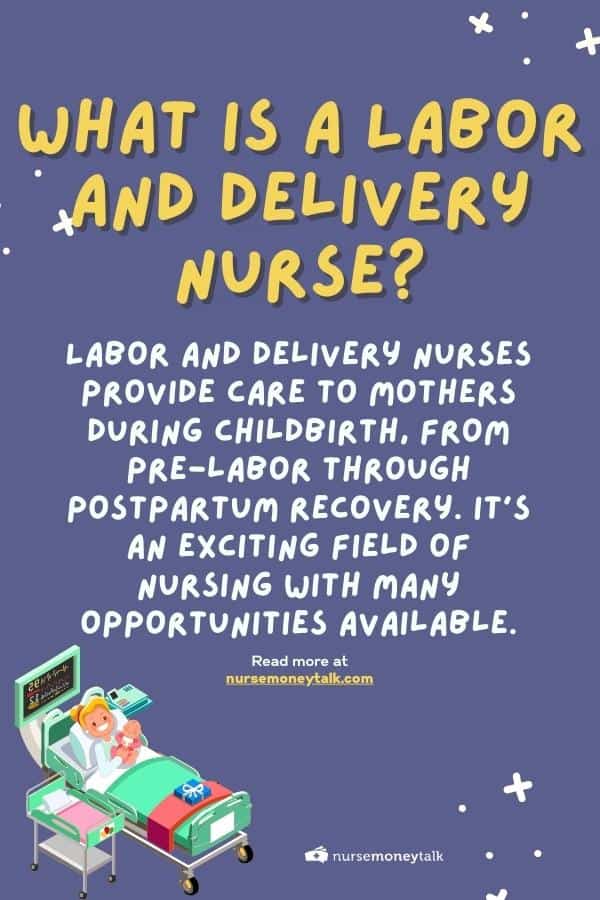Are you looking for a career that is both rewarding and challenging? Becoming a labor and delivery nurse could be the perfect fit.
Below, I’ll discuss what it takes to become a labor and delivery nurse.
This will include salary expectations, how to get started in the profession, where L & D nurses work, as well as their roles & duties within healthcare teams.
So if you’re interested in becoming a labor and delivery nurse yourself or just want more information about this fascinating area of nursing, then read on!
What is a Labor and Delivery Nurse?

Labor and delivery nurses provide care to mothers during childbirth, from pre-labor through postpartum recovery. It’s an exciting field of nursing with many opportunities available.
A labor and delivery nurse (L&D nurse) is a registered nurse who specializes in providing care to women during childbirth.
They are responsible for monitoring the mother’s health and the baby’s progress throughout labor and delivery.
Labor and delivery nurses must be knowledgeable about obstetric procedures, medications, pain management techniques, fetal monitoring equipment, and emergency protocols.
Responsibilities of a Labor & Delivery Nurse
The primary responsibility of a labor & delivery nurse is to ensure that both mother & baby remain safe throughout the entire process of birth. This includes:
- Monitoring vital signs such as blood pressure & heart rate
- Administering medications when necessary
- Educating patients on proper nutrition & exercise habits
- Assisting with medical interventions if needed
- Helping families make informed decisions regarding their birthing plan
- Assisting with routine assessments such as ultrasounds or amniocentesis tests
- Offering emotional support for mothers in distress or pain
- Operating specialized equipment like fetal monitors or epidural pumps if needed
- Maintaining accurate records for each patient’s medical history.
Salary of a Labor and Delivery Nurse
The average salary of a labor and delivery nurse is around $68,450 per year. This figure can vary depending on the experience level of the nurse, their geographic location, and other factors.
Benefits of Being a Labor and Delivery Nurse
Labor and delivery nurses enjoy many benefits that come with their job.
They have flexible schedules, which allow them to work when it suits them best. L & D nurses also get to be part of an important moment in people’s lives as they help bring new life into the world every day.
Additionally, labor and delivery nurses may receive additional compensation for overtime hours or call-in shifts if needed by their employer.
Factors That Affect the Salary of a Labor and Delivery Nurse
Several factors can affect how much money a labor and delivery nurse earns annually.
These include experience level, geographical location, type of facility where they work (hospital vs. private practice), and certification/specialization held by the nurse (such as NRP or RNC-OB).
Additionally, some employers offer bonuses or incentives based on performance metrics like patient satisfaction scores or successful deliveries within certain time frames, potentially increasing overall pay for labor & delivery nurses even further.
How to Become a Labor and Delivery Nurse

Becoming a labor and delivery nurse requires dedication, hard work, and specialized training.
To become a labor and delivery nurse, you must first meet the educational requirements for becoming a registered nurse (RN).
This typically involves completing an accredited nursing program at either the associate or bachelor’s level.
After graduating from your nursing program, you will need to take the National Council Licensure Examination (NCLEX-RN) to obtain your RN license.
Once you have obtained your RN license, additional training is required in order to specialize as a labor and delivery nurse.
Where Do Labor and Delivery Nurses Work?

Labor and delivery nurses work in various settings, including hospitals, private practices, birthing centers, and home births.
1. Hospitals that Employ Labor and Delivery Nurses
Most labor and delivery nurses are employed by hospitals. Hospitals typically provide the most comprehensive care for pregnant women throughout their pregnancy journey.
In addition to providing medical care during labor and delivery, hospital-based labor and delivery nurses may also be responsible for teaching pre-natal education classes or helping with postpartum follow-up visits.
2. Birthing Centers that Employ Labor & Delivery Nurses
Birthing centers are becoming increasingly popular due to their emphasis on natural childbirth methods.
Birthing methods such as water birth or midwifery services provided by certified nurse midwives (CNMs).
3. Home Births
Home births are becoming increasingly popular among expecting mothers who want a more intimate experience while giving birth.
These are the moms who want to give birth at home surrounded by family members instead of in a hospital setting where they feel disconnected from those closest to them.
FAQs in Relation to How to Become a Labor and Delivery Nurse
1. Is labor and delivery nursing hard?
Labor and delivery nursing can be challenging, as it requires specialized knowledge and skills to provide safe care for mothers and newborns.
It also involves long hours, dealing with emotionally charged situations, and managing complex medical conditions.
However, the rewards of this work are great; nurses in labor and delivery get to witness life-changing moments on a daily basis.
With dedication, hard work, and ongoing education, nurses can develop the necessary expertise to make a difference in the lives of their patients.
2. What skills are needed to become a labor and delivery nurse?
Becoming a labor and delivery nurse requires specialized knowledge and skills. L&D nurses must be able to:
- Assess the mother’s condition
- Monitor fetal heart rate, provide emotional support to the family
- Administer medications as needed
- Perform emergency procedures if necessary.
They also need excellent communication skills to effectively collaborate with other healthcare professionals.
Additionally, nurses should have strong critical thinking abilities to make quick decisions when caring for patients during labor and delivery.
3. What is the highest-paid nursing job?
The highest-paid nursing job is typically an Advanced Practice Registered Nurse (APRN). APRNs are registered nurses who have completed a master’s or doctoral degree program in nursing and passed a national certification exam.
They provide advanced care to patients, including diagnosing and treating illnesses, prescribing medications, ordering tests, and managing chronic conditions.
APRNs can also specialize in areas such as family practice, geriatrics, pediatrics, mental health, or women’s health.
Depending on the specialization chosen and the experience level of the APRN, salaries for this position can range from $80K to over $100K per year.
4. What are the nurses that deliver babies called?
Nurses who specialize in delivering babies are obstetric or labor and delivery nurses.
They care for pregnant women during pregnancy, labor, delivery, and postpartum periods. These specialized nurses are responsible for
- Monitoring the mother’s health throughout her pregnancy
- Providing education on childbirth and newborn care
- Assisting with labor and delivery procedures such as epidurals or forceps deliveries
- Caring for the newborn after birth
- Providing emotional support to the new family.
Obstetric nurses also work closely with physicians to ensure that both mother and baby receive quality medical care before, during, and after childbirth.
Key Takeaways
Not only do you get to help bring new life into the world, but you also have the opportunity to make a real difference in people’s lives.
With the right education and training, you can become a labor and delivery nurse who provides compassionate care for mothers and babies during one of the most important times of their lives.
If this sounds like something that interests you, start researching what it takes to become a labor and delivery nurse today!

